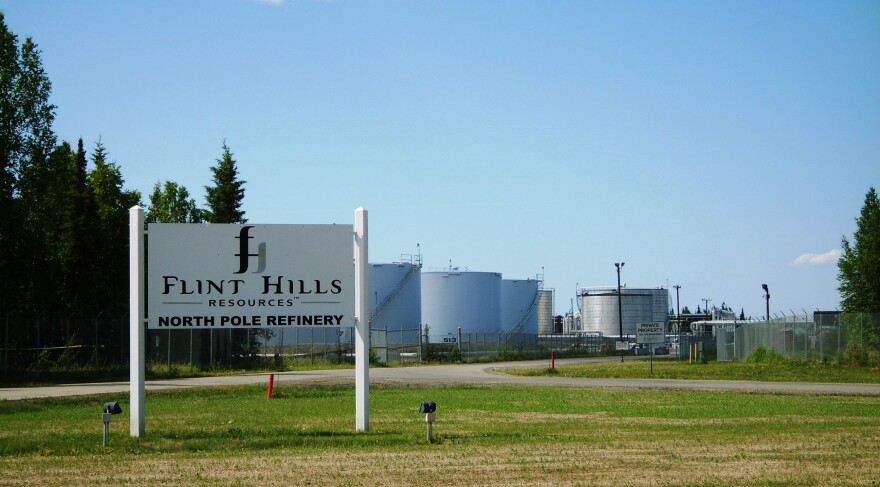Officials with Flint Hills Resources-Alaska began shutting down the company’s North Pole refinery today. The closure of the facility that makes gasoline is the first step toward mothballing the whole facility – the largest crude-oil refinery in the state.
Flint Hills took the refinery’s extraction unit off-line a minute past midnight this morning. That halts production of gasoline, but company spokesman Jeff Cook says the facility will continue to refine other petroleum products until later this month.
“The balance of the refinery we expect to take off-line and out of production three weeks later, around the 24th of May,” Cook said.
Flint Hills officials announced their decision to shut down the refinery in February, citing high operating costs and expenses associated with cleaning up North Pole-area groundwater tainted by sulfolane, an industrial solvent that leaked from the refinery for years.
Company officials plan to keep only the facility’s fuel terminal operating, to sell petroleum products brought in from other refineries.
The shutdowns are the beginning of the process of decommissioning the refinery – a process Cook likened to winterizing a facility that’s going to be sitting idle for a while. He says that’s being done in anticipation of the company eventually finding a buyer for the refinery, which was built in 1977 and expanded over the years. Flint Hills bought it in 2004.
“We’re doing it in such a way that if a buyer would come along within the next few months that we’d be able to start it back up again – or they would. So, it’s certainly not being torn down or anything,” he said.
Flint Hills and its parent company, Kansas-based multinational Koch Industries, have been trying for months to sell the refinery. Cook said Tuesday he can’t talk about the status of those efforts.
He says many of the workers in the 90 or so positions lost by the closure have taken the company up on its offer to give them jobs at other Flint Hills or Koch facilities.
The refinery closure will reduce the Fairbanks North Star Borough’s, and North Pole’s, property-tax revenues by millions of dollars.

The shutdown of refinery unit 2 will halt production of jet fuel, heating oil, diesel and two types of specialty fuels produced for Golden Valley Electric Association. In response, GVEA officials have proposed a temporary rate hike to pay the cost of transporting those fuels from elsewhere and to offset a steep reduction in the refinery’s electricity usage, which accounts for 6 percent of the utility’s total load.
GVEA President and CEO Cory Borgeson says if what he calls a “modest” rate increase is approved by regulators, it would remain in effect at least until the coal-fired Healy 2 powerplant begins operation sometime late next year.
“With the shutdown of the Flint Hills refinery, the fuel that they provide for our North Pole expansion plant, which is called naphtha, won’t be available any longer, and we’re going to have to find an alternate fuel for that,” Borgeson said. “And most of the fuel that we’ve been able to find readily are going to be about 18 percent higher in cost."
Borgeson says that does not mean ratepayers will be facing an 18 percent rate increase. He says it’ll be quite a bit less than that, because the fuels that’ll have to be brought in constitute only a fraction of the mix of fuels that the utility uses to generate electricity.
As for the groundwater contamination issue, Cook declined to say whether the company and the state have made any progress on resolving their disagreement over the state’s stringent cleanup level and other legal issues.
Gov. Sean Parnell in February absolved any future refinery owner of liability associated with the sulfolane contamination. And lawmakers last month passed a measure giving tax breaks and other assistance to refinery owners.
But Fairbanks North Star-Borough Mayor Luke Hopkins says the measure doesn’t go far enough. He says much more needs to be done immediately to both promote the sale of the refinery and to find solutions to the high price of North Slope royalty oil that the refinery is locked-in to using, as well as steep transportation and energy costs
“Is there an economic model that somebody would want to come in and operate that refinery with the current conditions that they have for royalty oil and quality bank,” Hopkins said. “I mean these things are incredible stresses on in-state refining.”
The mayor says it’ll take the combined efforts of all players, especially local and state government to come up with a solution – and soon.



